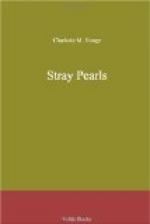And then this wild headstrong youth actually sank into a chair, hid his face on the table, and sobbed as if his heart would break.
I had no time for weeping then. I sent for the first physician in Nancy, and offered him any sum in the world to accompany me; I had to make almost wild efforts to procure a horse, and at last had to force one from the governor by my importunities. I collected wine and cordials, and whatever could be of service, and after his first outburst my young brother-in-law helped me in a way I can never forget. No doubt the pestiferous air caused by the horrible carnage of Freiburg had poisoned the wound. As soon as possible my husband was removed; but the mischief had been already done; the wound was in a bad state, fever had set in, and though he struggled on stage after stage, declaring that he should be well when he saw me, the agony had been such on the last day that they barely got him to Brisach, and he there became delirious, so that M. de Solivet decided on remaining with him, while the Count came on to fetch me. He had ridden ever since four o’clock in the morning, and yet was ready to set out again as soon as my preparations were complete. Oh, I can never overlook what he was to me on that journey!
Hope kept us up through that dismal country—the path of war, where instead of harvest on the August day we saw down-trodden, half-burned wheat fields, where a few wretched creatures were trying to glean a few ears of wheat. Each village we passed showed only blackened walls, save where at intervals a farmhouse had been repaired to serve as an estafette for couriers from the French army. The desolation of the scene seemed to impress itself on my soul, and destroy the hopes with which I had set forth; but on and on we went, till the walls of Brisach rose before us.
He was in the governor’s quarters, and only at the door, I perceived the M. d’Aubepine had much doubted whether we should find him alive. However, that one consolation was mine. He knew me; he smiled again on me; he called me by all his fondest names; he said that now he could rest. For twenty-four hours we really thought that joy was working a cure. Alas! then he grew worse again, and when the pain left him, mortification had set in, and we could only send for a priest to administer the last Sacraments.
I am an old woman now, and what was then the cruelest anguish touches me with pleasure when I think how he called me his guardian angel, and thanked me for having been his shield from temptation, placing his son in my sole charge, and commending his sister and his old uncle to me—his poor little sister whose lot seemed to grieve him so much. He talked to the Count, who wept, tore his hair, and made promises, which he really then intended to execute, and which at least comforted my Philippe.
The good priest who attended him said, he had never seen anything more edifying or beautiful, and that he had never heard the confession of a military man showing a purer heart, more full of holy love, trust, and penitence. There was a great peace upon us all, as his life ebbed away, and even the Count stood silent and awestruck. They took me away at last. I remember nothing but the priest telling me that my husband was in Paradise.




